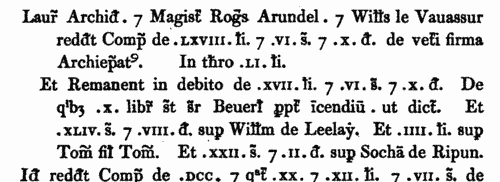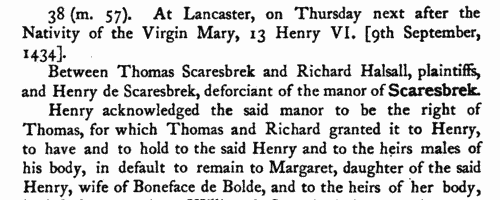Barres Surname Ancestry ResultsOur indexes 1000-1999 include entries for the spelling 'barres'. In the period you have requested, we have the following 21 records (displaying 1 to 10): Single Surname Subscription | | | Buying all 21 results of this search individually would cost £108.00. But you can have free access to all 21 records for a year, to view, to save and print, for £100. Save £8.00. More... |
These sample scans are from the original record. You will get scans of the full pages or articles where the surname you searched for has been found. Your web browser may prevent the sample windows from opening; in this case please change your browser settings to allow pop-up windows from this site. Pipe Rolls: Wiltshire
(1189-1190)
The Great Rolls of the Pipe contain returns of income and expenditure from the sheriffs and farmers of the various English sheriffdoms, counties or shires and from honors and bishoprics in the hands of the crown. This is the roll for the 1st year of the reign of king Richard I, that is, accounting for the year from Michaelmas 1189 to Michaelmas 1190. Many of the individual surnames that appear are in the accounts of fines &c. levied by justices.BARRES. Cost: £4.00.  | Sample scan, click to enlarge

| Close Rolls
(1302-1307)
The close rolls of the 31st to 35th years of the reign of king Edward I, that is to the day of his death (7 July 1307), record the main artery of government administration in England, the orders sent out day by day to individual officers, especially sheriffs of shires: they are an exceptionally rich source for so early a period. In amongst this official material, the rolls were also used as a way of recording many acknowledgments of private debts and contracts between individuals. Most of the contents relate to England, but there are also entries concerning Wales, Scotland, Ireland and the English possessions in France.BARRES. Cost: £4.00.  | Sample scan, click to enlarge

| Freemen and citizens of London
(1291-1309)
Letter Book C of the City of London contains enrolments of recognizances between inhabitants, particularly citizens, for sums of money lent or due; grants of pieces of land or property; and various records relating to the city administration, minor infractions, &c. The text was edited by Reginald R. Sharpe and printed by order of the Corporation of the City of London in 1901.BARRES. Cost: £4.00.  | Sample scan, click to enlarge

| Lancashire Feet of Fines
(1377-1509)
Pedes Finium - law suits, or pretended suits, putting on record the ownership of land in Lancashire. These abstracts were prepared by William Farrer for the Lancashire and Cheshire Record Society and published in 1905, under the title 'Final Concords of the County of Lancaster, from the Original Chirographs, or Feet of Fines, preserved amongst the Palatinate of Lancaster Records in the Public Record Office'. They cover the period from John duke of Lancaster to the end of the reign of king Henry VII. In addition, there are abstracts of fines paid for various Lancashire writs from 1377 to 1509, and a fine of 1195 that had been discovered during the preparation of the volume.BARRES. Cost: £4.00.  | Sample scan, click to enlarge

| Freemen of London
(1540-1550)
The long series of mediaeval registers and books of admission of the freemen of London was destroyed by fire in 1786. Thirty surviving charred leaves were gathered together and rebound, becoming Egerton MS 2408 in the British Museum. The order is jumbled and generally speaking none can be dated with certainty, although all belong to the very end of the reign of Henry VIII and the start of the reign of his son, Edward VI. These are pages from the admission books. Each entry here usually gives the name of the person admitted to the freedom; his father's name, address and occupation; his entitlement to the freedom, usually by having served out an apprenticeship to a citizen, naming the master and his trade. Then there may follow a cross-reference to M. or N., being two volumes of another set of official books denoted by the letters of the alphabet, and following each other in chronological sequence, which evidently gave details of entries into apprenticeships. These other books no longer exist: but the dates given for entry do identify the start of the apprenticeship, and so give by implication a date for the eventual admission to freedom. In the margin is the name of the city ward and the total of the fee and fine paid on admission.BARRES. Cost: £4.00.  | Sample scan, click to enlarge

| Middlesex Sessions
(1549-1603)
This printed calendar collates a number of surviving records from Middlesex sessions for the period. Principally these are the Gaol Delivery Rolls (G. D. R.) and the General Sessions of the Peace Rolls (G. S. O. P. R.). Both series cover general criminal indictments (bills) together with the recognizances of the witnesses to attend; but the Gaol Delivery Rolls, by their very nature, tend to deal with the more serious cases - felonies where the accused could not be released on bail. The General Sessions rolls also include the sheriff's lists of bailiffs, sub-bailiffs, high and petty constables in the shire; writs of venire facias for production of jurors, writs of capias, lists of jurors, jury-panels &c. The Gaol Delivery Rolls also include coroners' inquests, writs of supersedeas, and memoranda of proclamations. Special inquiries are recorded in separate Sessions of Oyer and Terminer (S. O. T.) rolls and Inquest or Inquisition rolls (I. R.) Although coverage is good, none of the sequences of rolls for this period is complete. A peculiarity of this calendar is that in the case of actual incidents, the date given at the start of each entry is the date that the incident was alleged to have taken place (for instance, 1 June 11 Elizabeth (1569) in the sample scan) rather than the date of the court proceedings. BARRES. Cost: £4.00.  | Sample scan, click to enlarge

| Lancashire and Cheshire Marriage Licences
(1606-1616)
Licences for intended marriages in Chester archdeaconry, which covered Cheshire and Lancashire south of the Ribble (by far the most populous part of that county)BARRES. Cost: £4.00.  | Sample scan, click to enlarge

| Nottinghamshire Marriage Licences
(1577-1700)
Nottingham Archdeaconry, which was almost coextensive with the county of Nottingham, lay in the diocese and province of York, but it had substantially independent jurisdiction for both probate and the issuing of marriage licences. These are abstracts of the archdeaconry marriage licences: they usually state the groom's address, occupation, age, and condition; the bride's address, age and condition; and the names of the churches or parishes at which it was intended the marriage would be celebrated. Not all licences led to marriages. Where the age given is 21, it should be construed as '21 or over'. There was no obligation for the marriage to take place at the parish suggested, but the licence would only be valid within the county. These abstracts have been annotated with extra information found on the marriage bonds. 26 Nottinghamshire parishes (Beckingham, Darlton, Dunham, Eaton, North Leverton, Ragnall, Rampton, South Wheatley, Cropwell Bishop, Bleasby, Blidworth, Calverton, Caunton, Edingley, Farnsfield, Halloughton, Holme, Kirklington, Morton, North Muskham, Norwell, Oxton, South Muskham, Southwell, Upton and Woodborough) lay within the small peculiar jurisdiction of Southwell, which issued its own licences: abstracts of these for the period 1588 to 1754 are also included here.BARRES. Cost: £4.00.  | Sample scan, click to enlarge

|  Masters and Apprentices
(1741) Masters and Apprentices
(1741)
Apprenticeship indentures and clerks' articles were subject to a 6d or 12d per pound stamp duty: the registers of the payments usually give the master's trade, address, and occupation, and the apprentice's father's name and address, as well as details of the date and length of the apprenticeship. 1 January to 31 December 1741BARRES. Cost: £8.00.  | Sample scan, click to enlarge

|  Apprentices registered at Northampton
(1760) Apprentices registered at Northampton
(1760)
Apprenticeship indentures and clerks' articles were subject to a 6d or 12d per pound stamp duty: the registers of the payments usually give the master's trade, address, and occupation, and the apprentice's name, as well as details of the date and length of the apprenticeship. There are central registers for collections of the stamp duty in London, as well as returns from collectors in the provinces. These collectors generally received duty just from their own county, but sometimes from further afield. The indentures themselves can date from a year or two earlier than this return. (The sample entry shown on this scan is taken from a Bristol return. Each entry has two scans, the other being the facing page with the details of the indenture, length of service, and payment of duty.) IR 1/53BARRES. Cost: £8.00.  | Sample scan, click to enlarge

|
Research your ancestry, family history, genealogy and one-name study by direct access to original records and archives indexed by surname.
|













